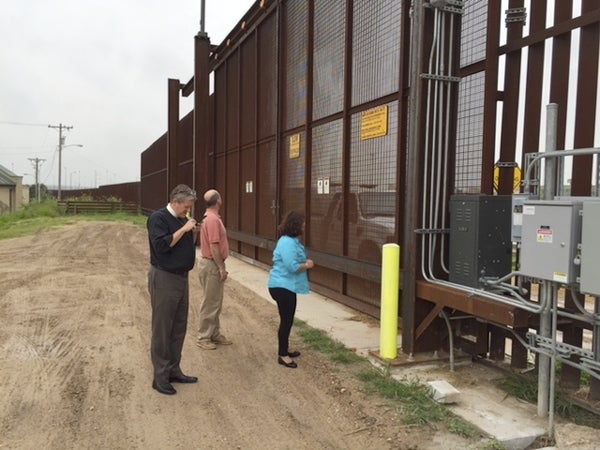Ted Goins: Visit to Texas-Mexico border opened eyes
Published 12:00 am Sunday, July 5, 2015

- Visitors look through the fence along the border to see Reynosa, Mexico, across the Rio Grande.
By Ted Goins
Special to the Post
Undocumented migrants, undocumented children, border security, ministry, Somali refugees, Cuban asylees, demographics, and immigration politics: These were the fascinating subjects of a two-day trip I made to the Mexican border recently, along with about 15 other Lutheran Immigration and Refugee Service (LIRS) representatives.
LIRS is our national organization that supports refugees, immigrants, and migrants. Lutheran Services Carolinas is the LIRS affiliate that resettles refugees in the Carolinas.
We spent the first day in and around Hidalgo, Texas, on the Mexican border, which was an eye-opening experience. I have never seen so many police; you could rarely look in either direction without seeing a police car. The U.S. Border Patrol was ever present along the border, supplemented by even more Texas law enforcement. Taking a hard stance against undocumented migrants, Texas has beefed up law enforcement.
As always, there are two sides to the issue. Law enforcement is upholding the law. Still, many of the undocumented have been here for years or even generations. Many of them have children born in the U.S., who are therefore citizens. They obviously fear the law enforcement presence, which could sweep up a single mother on her way home from work. A broken tail light can easily tear a family apart.
We got to see the patrolling played out when our unmarked, tinted-window rental bus was pulled over. The Texas state patrolman seemed surprised when he climbed up the steps to find a dozen white, middle-aged tourists staring at him with apprehension. We were not what he was looking for. He smiled, said hello, and didn’t even check our ID.
Afterward, we walked right up to the giant border fence and looked over the Rio Grande River into Reynosa, Mexico. We toured the colonias (colonies) along the border where thousands of people, documented and undocumented, live in houses they do not own and on land they do not own. But they’ve been there so long that they buy and sell these houses (many are shacks) without a title, deed, bank or lawyer. They’ve created their own economy.
We were able to sit down with two mothers and their children to hear of life and fear and hope in the colonias. I asked one third-grader what he liked best in school and what he wanted to be when he grows up: math and fireman! His first-grade sister: writing and school teacher! Hope springs eternal!
We toured a small ministry run by the sainted Sisters of Divine Providence where we met a dozen Somali refugees. Somalis? Were they lost? Was I lost?
People from Somalia are immediately granted asylum in the United States, if they can get here. The problem is that there is no way to get here. But these Somalis have found a way. They ride and walk from Somalia to South Africa, are smuggled to Brazil on the next continent, make their way west across the Amazon, through Peru, Ecuador, Colombia, Central America, and through Mexico to the U.S. border. If they get here, the prize is asylum.
What would make someone take a trip that many don’t survive? Their stories are haunting: My father was beaten, my brother was killed, I was held prisoner, I escaped….
The border is also teeming with Cubans. A relic of the Cold War, asylum is granted any Cuban who makes it to the U.S. For many years, Castro wouldn’t let anyone leave. Now, Cuba is willing to give its citizens exit visas. Enterprising Cubans travel to Mexico, make it to the border, and present themselves to the U.S. Border Patrol and ask for asylum. Partly as a result, Houston has the largest population of Cubans in America, behind only Miami. When Cuba and the U.S. normalize relations that path will stop, so Cubans are coming as fast as they can get here.
In Houston on the second day, we visited with Refugee Services of Texas, our sister LIRS affiliate. They do great work across Texas. We met Chalak, a refugee from Iraq who is now a staff member. Chalak was an interpreter for our U.S . troops in Bagdad. He told us that his car was bombed, though, thankfully, he was not inside. Sadly, two of his best friends were. He was granted refugee status and removed to the U.S. before he, too, was killed. Once again, America is doing the right thing by supporting a refugee who supported our troops.
We heard from Rice University professor Dr. Stephen Klineberg about the demographics of Houston and its rich diversity, and demographic trends in America.
The major takeaway for me is that we desperately need immigration reform. The system is broken, and we need immigrants to fuel nationwide entrepreneurship and economic growth. Sealing the border to all immigrants seals our fate as a post-modern, declining nation.
I learned a lot about LIRS and other related ministries, national policy issues, and other cultures. I also I learned how good we’ve got it and to be thankful for that.
Ted W. Goins Jr. is president and CEO of Lutheran Services Carolinas.

